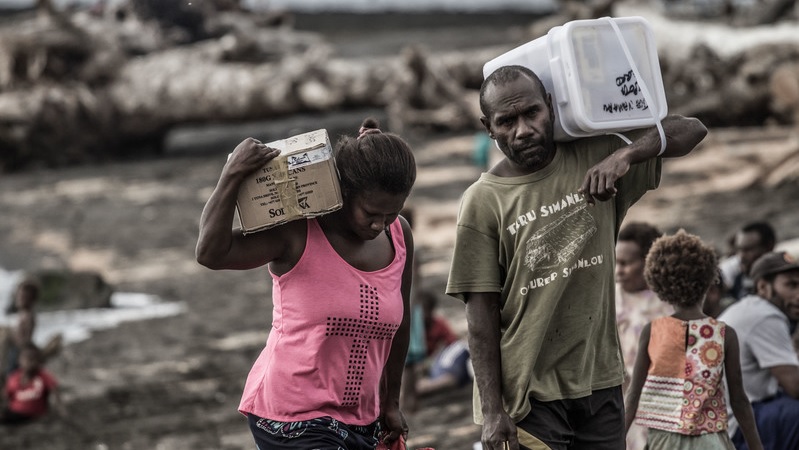Government officials from small island developing states (Sids) have said they find it difficult to get money from the Green Climate Fund (GCF) for projects to help them adapt to climate change.
The GCF was set up in 2010 to distribute money from rich countries to poorer ones to help them cut emissions and adapt to climate change.
The fund is supposed to pay particular attention to the needs of small islands as well as the world’s poorest countries (LDCs) and African countries.
Small island officials told the authors of a new ODI report that getting money from the GCF was preferable to getting it from other sources like the World Bank, International Monetary Fund or the private sector.
Polish election result improves prospects for EU climate ambition
But, they said that GCF money was handed out too slowly, the process of applying is too difficult for nations with small civil services and a number of requirements discriminate against smaller nations.
Emily Wilkinson is the lead author of the report, which was shared exclusively with Climate Home. She said that “small island developing states really value the GCF, there’s nothing like it”.
But, she said, “the fact that a third of the proposals of all countries that we spoke to have been in the pipeline for over three years is quite staggering”.
Beneficiary metrics
With funding from rich nations stagnating, the GCF is looking to do as much as it can with its limited money. That’s made things harder for small islands.
Colin Young is a former government official from Belize and is now the head of the Caribbean Community Climate Change Centre, which has worked with the GCF on projects in Barbados.
He told Climate Home that when they apply for projects, the GCF is increasingly telling them they need to get the cost per person helped down.
ODI report author Emily Wilkinson told Climate Home that one small island was told by the GCF that “the investment figures are very large compared to the beneficiary population and the climate impact”.
Africa and India push rich nations to phase out fossil fuels faster
The GCF’s investment criteria lists “impact potential” as one metric. As an example, it mentions “number of beneficiaries, number of people affected by climate impacts”.
As small island nations tend to have small populations, the number of beneficiaries is often in the low thousands.
"How do we say in a small country that is in the middle of a hurricane belt, droughts and floods - where people are impacted on the frontlines of climate change - and say that your project we have difficulty funding it because each person is going to get too much per capita from the resources?" Young asked.
Dominica was devastated by a hurricane in 2019. Its environment minister Cozier Frederick said that "adaptation and resilience funding needs are naturally higher for small island states compared to projects in other developing nations".
"Consequently," he said, "there is constant push back from the GCF on costs when applications are submitted".
A GCF spokesperson told Climate Home that number of beneficiaries was one of its "core indicators" but that there was no minimum threshold that has to be met.
Grants vs loans
The report found that one thing small islands like about the GCF is that it offers grants as well as loans.
But, with funding scarce, the report found the GCF is increasingly looking more to loans, so it gets its money back and can lend it out for another projects.
Renewable energy projects tend to be funded through loans, as the solar and wind panels generate electricity which can be sold, generating money to pay back the loan.
But, while that might work for a big solar farm in a large middle-income country like China, not every renewable energy project will make money.
Young said that for small islands, solar panels are often more about resilience to weather extremes than about reducing emissions.
For example, he said, solar panels can provide back-up energy to hospitals or water pumping stations when a storm knocks out the fossil fuel-powered electricity generator. But those solar panels won't make enough money to pay back the cost of installing them.
He said that the GCF's "increasing desire" to use loans not grants comes from the fact that the needs of developing countries "are clearly much greater than the resources the GCF has".
Nevertheless, he said small islands and the least developed countries "should not be lumped into the category with countries that clearly have less vulnerabilities in terms of size and geography and population".
Getting better
While problems remain, ODI's report found the GCF has taken measures to help small islands get funds.
In particular, small islands appreciated a GCF programme which gives each government $1 million to train staff and engage stakeholders to access GCF funds without relying on private consultants.
One anonymous Pacific interviewee described this as "super important" while a Caribbean official said it "has certainly helped us".
Most of the report's fieldwork was done before Mafalda Duarte took over as head of the GCF in August 2023.
A GCF spokesperson said the GCF gives half its funding to adaptation and half of that goes to LDCs, Sids and African states.
They added that the GCF is a "strong partner for Sids because of the eligiblity challenges small island developing states face with other sources of finance".
They said that there are "processes in place ensure that once a project is brought to the Board for approval GCF is confident of its impact potential. Processes are rigourous for that very reason."
They acknowledged that the GCF must speed up and simplify its process and said it had an "ambitious reform agenda".
